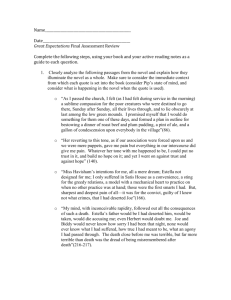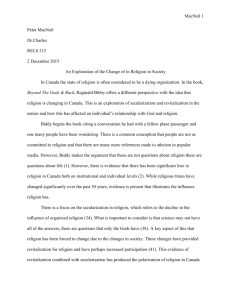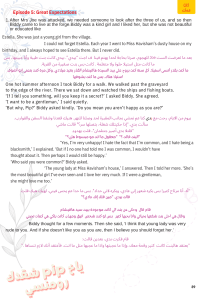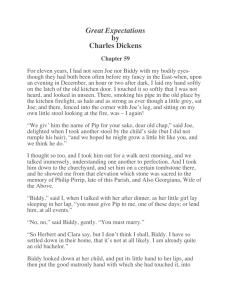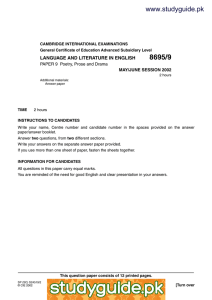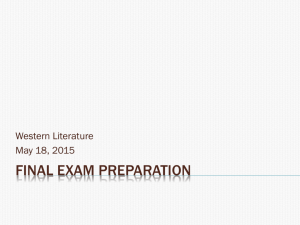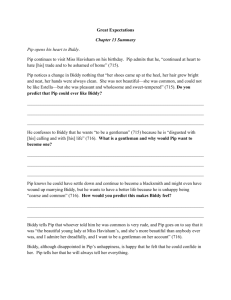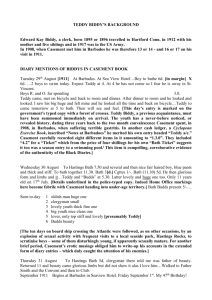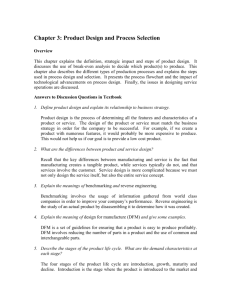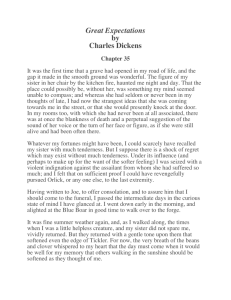www.studyguide.pk
advertisement
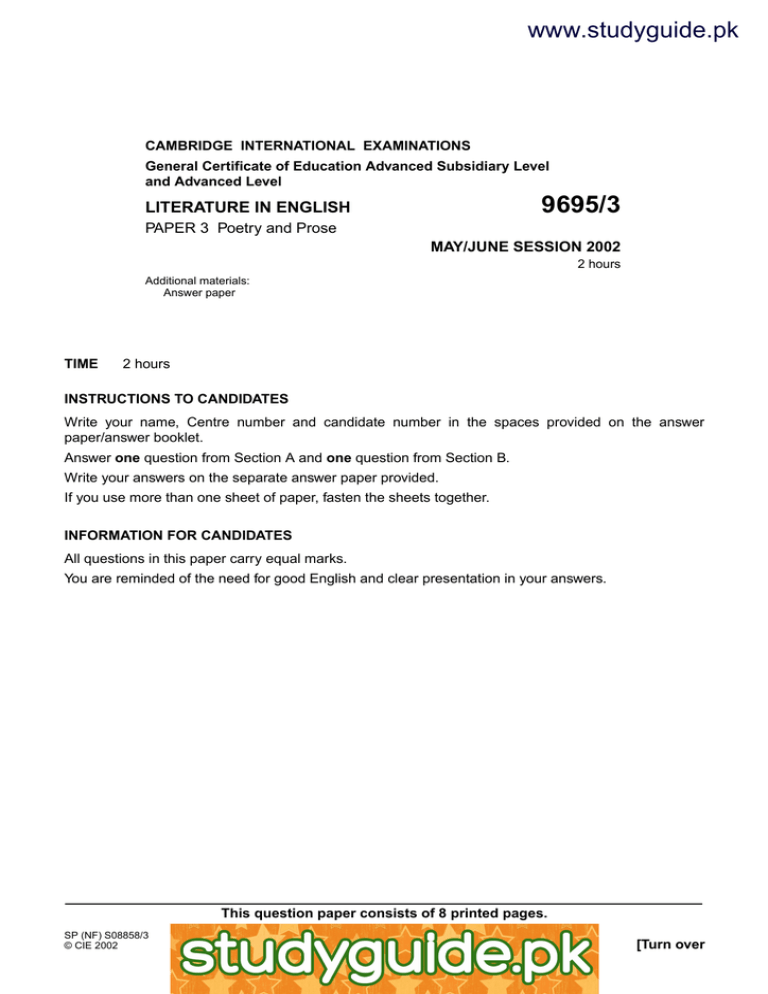
www.studyguide.pk CAMBRIDGE INTERNATIONAL EXAMINATIONS General Certificate of Education Advanced Subsidiary Level and Advanced Level 9695/3 LITERATURE IN ENGLISH PAPER 3 Poetry and Prose MAY/JUNE SESSION 2002 2 hours Additional materials: Answer paper TIME 2 hours INSTRUCTIONS TO CANDIDATES Write your name, Centre number and candidate number in the spaces provided on the answer paper/answer booklet. Answer one question from Section A and one question from Section B. Write your answers on the separate answer paper provided. If you use more than one sheet of paper, fasten the sheets together. INFORMATION FOR CANDIDATES All questions in this paper carry equal marks. You are reminded of the need for good English and clear presentation in your answers. This question paper consists of 8 printed pages. SP (NF) S08858/3 © CIE 2002 http://www.xtremepapers.net [Turn over www.studyguide.pk 2 Section A: Poetry Answer one question from this section. WILLIAM BLAKE : Songs of Innocence and Experience 1 Either (a) ‘Blake’s verse is filled with a religious spirit, but he dislikes organised religion.’ With reference to three poems, discuss how far you agree with this view. Or (b) Comment closely on the following poem, saying how far its style and concerns are characteristic of the Songs of Innocence. Spring Sound the Flute! Now it’s mute. Birds delight Day and Night, Nightingale In the dale Lark in Sky Merrily Merrily Merrily to welcome in the Year Little Boy Full of joy. Little Girl Sweet and small, Cock does crow So do you. Merry Voice Infant noise Merrily Merrily to welcome in the Year Little Lamb Here I am, Come and lick My white neck. Let me pull Your soft Wool. Let me kiss Your soft face. Merrily Merrily we welcome in the Year 9695/3/M/J/02 5 10 15 20 25 www.studyguide.pk 3 Touched with Fire ed. HYDES (Sections E and F) 2 Either (a) Several of the poems in your selection concern relationships between children and parents. Compare the methods and effects of any two such poems. Or (b) Discuss the writer’s concerns and poetic methods in the following poem: Composed Upon Westminster Bridge Earth has not anything to show more fair: Dull would he be of soul who could pass by A sight so touching in its majesty: This City now doth like a garment wear The Beauty of the morning; silent, bare, Ships, towers, domes, theatres and temples lie Open unto the fields, and to the sky; All bright and glittering in the smokeless air. Never did sun more beautifully steep In his first splendour, valley, rock, or hill; Ne’er saw I, never felt, a calm so deep! The river glideth at his own sweet will: Dear God! the very houses seem asleep; And all that mighty heart is lying still! 5 10 William Wordsworth 9695/3/M/J/02 [Turn over www.studyguide.pk 4 SYLVIA PLATH : Ariel 3 Either (a) ‘Trepanned veteran, Dirty girl, Thumb stump.’ One of the features of Plath’s poetry is her use of striking and unusual metaphor. Discuss the effects of this technique in two or three poems from Ariel. Or (b) Comment closely on the following poem, saying how far you find its tone and concerns typical of Plath’s poetry in Ariel. Letter in November Love, the world Suddenly turns, turns colour. The streetlight Splits through the rat’s-tail Pods of the laburnum at nine in the morning. It is the Arctic, 5 This little black Circle, with its tawn silk grasses – babies’ hair. There is a green in the air, Soft, delectable. It cushions me lovingly. 10 I am flushed and warm. I think I may be enormous, I am so stupidly happy, My Wellingtons Squelching and squelching through the beautiful red. 15 This is my property. Two times a day I pace it, sniffing The barbarous holly with its viridian Scallops, pure iron, 20 And the wall of old corpses. I love them. I love them like history. The apples are golden, Imagine it— 25 My seventy trees Holding their gold-ruddy balls In a thick grey death-soup, Their million Gold leaves metal and breathless. 30 O love, O celibate. Nobody but me Walks the waist-high wet. The irreplaceable Golds bleed and deepen, the mouths of Thermopylae. 35 9695/3/M/J/02 www.studyguide.pk 5 Section B: Prose Answer one question from this section. CHINUA ACHEBE : Things Fall Apart 4 Either (a) At different points in the novel, Achebe’s narrator states ‘mother is supreme’ and ‘It was clear from the way the crowd stood or sat that the ceremony was for men. There were many women, but they looked on from the fringe like outsiders.’ Discuss the presentation of women in the novel in the light of these statements. Or (b) Discuss the presentation of Ezeudu’s funeral in the following passage, and its significance in the novel. Ezeudu was a great man, and so all the clan was at his funeral. The ancient drums of death beat, guns and cannon were fired, and men dashed about in frenzy, cutting down every tree or animal they saw, jumping over walls and dancing on the roof. It was a warrior’s funeral, and from morning till night warriors came and went in their age-groups. They all wore smoked raffia skirts and their bodies were painted with chalk and charcoal. Now and again an ancestral spirit or egwugwu appeared from the underworld, speaking in a tremulous, unearthly voice and completely covered in raffia. Some of them were very violent, and there had been a mad rush for shelter earlier in the day when one appeared with a sharp matchet and was only prevented from doing serious harm by two men who restrained him with the help of a strong rope tied round his waist. Sometimes he turned round and chased those men, and they ran for their lives. But they always returned to the long rope he trailed behind. He sang, in a terrifying voice, that Ekwenzu, or Evil Spirit, had entered his eye. But the most dreaded of all was yet to come. He was always alone and was shaped like a coffin. A sickly odour hung in the air wherever he went, and flies went with him. Even the greatest medicine-men took shelter when he was near. Many years ago another egwugwu had dared to stand his ground before him and had been transfixed to the spot for two days. This one had only one hand and with it carried a basket full of water. But some of the egwugwu were quite harmless. One of them was so old and infirm that he leaned heavily on a stick. He walked unsteadily to the place where the corpse was laid, gazed at it a while and went away again — to the underworld. The land of the living was not far removed from the domain of the ancestors. There was coming and going between them, especially at festivals and also when an old man died, because an old man was very close to the ancestors. A man’s life from birth to death was a series of transition rites which brought him nearer and nearer to his ancestors. Ezeudu had been the oldest man in the village, and at his death there were only three men in the whole clan who were older, and four or five others in his own age-group. Whenever one of these ancient men appeared in the crowd to dance unsteadily the funeral steps of the tribe, younger men gave way and the tumult subsided. It was a great funeral, such as befitted a noble warrior. As the evening drew near, the shouting and the firing of guns, the beating of drums and the brandishing and clanging of matchets increased. Ezeudu had taken three titles in his life. It was a rare achievement. There were only four titles in the clan, and only one or two men in any generation ever achieved the fourth and highest. When they did, they became the lords of the land. Because he had taken titles, Ezeudu was to be buried after dark with only a glowing brand to light the sacred ceremony. 9695/3/M/J/02 5 10 15 20 25 30 35 40 [Turn over www.studyguide.pk 6 But before this quiet and final rite, the tumult increased tenfold. Drums beat violently and men leaped up and down in a frenzy. Guns were fired on all sides and sparks flew out as matchets clanged together in warriors’ salutes. The air was full of dust and the smell of gunpowder. It was then that the one-handed spirit came, carrying a basket full of water. People made way for him on all sides and the noise subsided. Even the smell of gunpowder was swallowed in the sickly smell that now filled the air. He danced a few steps to the funeral drums and then went to see the corpse. ‘Ezeudu!’ he called in his gutteral voice. ‘If you had been poor in your last life I would have asked you to be rich when you come again. But you were rich. If you had been a coward, I would have asked you to bring courage. But you were a fearless warrior. If you had died young, I would have asked you to get life. But you lived long. So I shall ask you to come again the way you came before. If your death was the death of nature, go in peace. But if a man caused it, do not allow him a moment’s rest.’ He danced a few more steps and went away. Chapter Thirteen 9695/3/M/J/02 45 50 55 www.studyguide.pk 7 CHARLES DICKENS : Great Expectations 5 Either (a) ‘My life has been a blind and thankless one,’ says Pip to Miss Havisham in Chapter 49. How far do you agree with his assessment of himself? Or (b) Comment closely on the following passage, discussing the significance of the relationship between Biddy and Pip and the way it is presented here. So, when we had walked home and had had tea, I took Biddy into our little garden by the side of the lane, and, after throwing out in a general way for the elevation of her spirits, that I should never forget her, said I had a favour to ask of her. ‘And it is, Biddy,’ said I, ‘that you will not omit any opportunity of helping Joe on, a little.’ ‘How helping him on?’ asked Biddy, with a steady sort of glance. ‘Well! Joe is a dear good fellow — in fact, I think he is the dearest fellow that ever lived — but he is rather backward in some things. For instance, Biddy, in his learning and his manners.’ Although I was looking at Biddy as I spoke, and although she opened her eyes very wide when I had spoken, she did not look at me. ‘Oh, his manners! won’t his manners do, then?’ asked Biddy, plucking a blackcurrant leaf. ‘My dear Biddy, they do very well here —’ ‘Oh! they do very well here?’ interrupted Biddy, looking closely at the leaf in her hand. ‘Hear me out — but if I were to remove Joe into a higher sphere, as I shall hope to remove him when I fully come into my property, they would hardly do him justice.’ ‘And don’t you think he knows that?’ asked Biddy. It was such a very provoking question (for it had never in the most distant manner occurred to me), that I said, snappishly, ‘Biddy, what do you mean?’ Biddy having rubbed the leaf to pieces between her hands — and the smell of a black-currant bush has ever since recalled to me that evening in the little garden by the side of the lane — said, ‘Have you never considered that he may be proud?’ ‘Proud?’ I repeated, with disdainful emphasis. ‘Oh! there are many kinds of pride,’ said Biddy, looking full at me and shaking her head; ‘pride is not all of one kind —’ ‘Well? What are you stopping for?’ said I. ‘Not all of one kind,’ resumed Biddy. ‘He may be too proud to let any one take him out of a place that he is competent to fill, and fills well and with respect. To tell you the truth, I think he is: though it sounds bold in me to say so, for you must know him far better than I do.’ ‘Now, Biddy,’ said I, ‘I am very sorry to see this in you. I did not expect to see this in you. You are envious, Biddy, and grudging. You are dissatisfied on account of my rise in fortune, and you can’t help showing it.’ ‘If you have the heart to think so,’ returned Biddy, ‘say so. Say so over and over again, if you have the heart to think so.’ ‘If you have the heart to be so, you mean, Biddy,’ said I, in a virtuous and superior tone; ‘don’t put it off upon me. I am very sorry to see it, and it’s a — it’s a bad side of human nature. I did intend to ask you to use any little opportunities you might have after I was gone, of improving dear Joe. But after this, I ask you nothing. I am extremely sorry to see this in you, Biddy,’ I repeated. ‘It’s a — it’s a bad side of human nature.’ ‘Whether you scold me or approve of me,’ returned poor Biddy, ‘you may equally depend upon my trying to do all that lies in my power, here, at all times. And whatever opinion you take away of me, shall make no difference in my remembrance of you. Yet a gentleman should not be unjust neither,’ said Biddy, turning away her head. 9695/3/M/J/02 5 10 15 20 25 30 35 40 45 Chapter 19 [Turn over www.studyguide.pk 8 DORIS LESSING : Martha Quest 6 Either (a) Discuss Lessing’s presentation of Stella and Andrew Mathews, and their contribution to the novel. Or (b) Comment closely on the following passage, focusing on the presentation of the prisoners and of Martha’s response to them. For there was no doubt that the root of all this dissatisfaction was that she deserved something life had not offered her. The daydream locked not only her mind, but her limbs; soon she was cramped and stiff, and she had to get up and move about the room, till the blood flowed back, and she went to the door to receive the flood of now soft and hotly welcoming sunlight. It was as if the night had never been; for the light was heavy and rich and yellow, the sky was as thick with rain clouds as it had been yesterday, there was still the oppressive atmosphere of coming storm. There was the ringing of hard boots on tarmac, and the soft padding of bare feet. She stood quite still while past her moved a file of men. First, two policemen in the boots, their crisp khaki tunics belted tight, their buttons shining, their little hats cocked at an angle. Then perhaps twenty black men and women, in various clothing, barefooted and shabby. Then, following these, two more policemen. The prisoners were handcuffed together, and it was these hands that caught Martha’s attention: the working hands, clasped together by broad and gleaming steel, held carefully at waist level, steady against the natural movement of swinging arms — tender dark flesh cautious against the bite of the metal. These people were being taken to the magistrate for being caught at night after curfew, or forgetting to carry one of the passes which were obligatory, or — but there were a dozen reasons, each as flimsy. Now, Martha had seen this sight so often that she was not dulled to it so much as patiently angry. She marched, in imagination, down the street, one of the file, feeling the oppression of a police state as if it were heavy on her; and at the same time was conscious of the same moral exhaustion which had settled on her earlier. She was thinking, It’s all so dreadful, not because it exists, merely, but because it exists now. She was thinking — since she had been formed by literature, she could think of no other way — that all this had been described in Dickens, Tolstoy, Hugo, Dostoevsky, and a dozen others. All that noble and terrific indignation had done nothing, achieved nothing, the shout of anger from the nineteenth century might as well have been silent — for here came the file of prisoners, handcuffed two by two, and on their faces was that same immemorial look of patient, sardonic understanding. The faces of the policemen, however, were the faces of those doing what they were paid to do. And what now? demanded that sarcastic voice inside Martha; and it answered itself, Go out and join the Prisoners’ Aid Society. Here she sank into self-derisory impotence, and, leaving the door, returned to her room. A clock was chiming hurriedly from the back veranda. Seven o’clock, time to dress for the office. But first she lifted the books from the floor, and looked through them as if she were looking for a kind of deliverance. 5 10 15 20 25 30 35 Part Three, Chapter Two Copyright Acknowledgements : Question 3a Question 3b Question 4 Question 6 Sylvia Plath, ‘Cut’. Faber and Faber © Sylvia Plath, ‘Letter in November’. Faber and Faber © Chinua Achebe. Things Fall Apart. Butterworth Heinemann. Doris Lessing. Martha Quest. HarperCollins Publishers. © Cambridge International Examinations has made every effort to trace copyright holders, but if we have inadvertently overlooked any we will be pleased to make the necessary arrangements at the first opportunity. 9695/3/M/J/02
